|
|
|
Sort Order |
|
|
|
Items / Page
|
|
|
|
|
|
|
| Srl | Item |
| 1 |
ID:
168232


|
|
|
|
|
| Summary/Abstract |
This paper delves into the rise and decline of Lagos’ China Town and its role as a locus of interactions between Chinese migrants and the Nigerian state. I argue that the rise and fall of Chinese private investment in Lagos’ China Town is explained by the Nigerian state’s adjustment to its own entry into the global market. While some Nigerian government officials formed a shared interest of community with Chinese traders via allowing smuggling and grey customs clearance, others frequently raided China Town in the name of protecting local industries. I also argue that Nigerian traders’ and consumers’ perspectives on substandard made-in-China products differed sharply from those of the Nigerian state and manufacturers.
|
|
|
|
|
|
|
|
|
|
|
|
|
|
|
|
| 2 |
ID:
137194
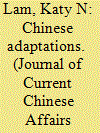

|
|
|
|
|
| Summary/Abstract |
Chinese migrant entrepreneurs in Ghana perceive themselves as vulnerable, as regularly they encounter problems and their businesses fail. The adaption experiences of Chinese entrepreneurs in Africa, especially non-traders, remain largely unstudied. By looking at the interactions of newly arrived and established Chinese migrants with institutional actors, partners, local employees and other Chinese in Ghana, this paper shows the multiple dimensions of how Chinese entrepreneurs’ migration adaptation evolves, and how they create social capital to develop their businesses in Ghana. From the Chinese perspective, established entrepreneurs condemn the recent numerous “new” Chinese in Ghana as part of the root cause of problems, on account of their “poor quality and bad behaviour”; by comparison, the newly arrived Chinese attribute their challenges to deficiencies in the local people and institutions of the host country. The negative experiences of Chinese entrepreneurs in Ghana provide further evidence for, not only African, but also local Chinese agency from below, and suggest that the rising Chinese presence does not necessarily improve the social status of Chinese entrepreneurs or create a stronger, more unified Chinese community on the continent.
|
|
|
|
|
|
|
|
|
|
|
|
|
|
|
|
| 3 |
ID:
114776
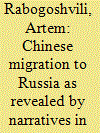

|
|
|
|
|
| Publication |
2012.
|
| Summary/Abstract |
This article provides an analysis of the electronic resources in the Chinese cyberspace devoted to the labor migration of Chinese people to Russia. In recent years, Russia has become an important destination country for Chinese labor migration, and migrating to Russia to work has been officially promoted as a potential means of poverty alleviation in northeast China. The author contrasts this state-regulated imagination - which in his understanding is based not least on the current Sino-Russian rapprochement - with more nuanced and competing constructions that are negotiated and circulated within the more informal and semi-anonymous virtual spaces of online bulletin board systems.
|
|
|
|
|
|
|
|
|
|
|
|
|
|
|
|
| 4 |
ID:
193127


|
|
|
|
|
| Summary/Abstract |
In 1874, the French colonial state introduced an extensive regime of ethnic surveillance in the port cities of Sài Gòn-Chợ Lớn. This pioneering system in Vietnam relied on an innovative anthropometric science to target Chinese migrants, whose mobile networks posed ongoing concerns for the imperial authority. This article explores the strategies employed by Chinese migrants to navigate the enforced ethnic classifications and regulations imposed by the colonial administration, exploiting the uncertain boundaries between subjects, foreigners, and citizens. It argues that Chinese subversions emerged through a dynamic interplay with the evolving French bureaucratic practices, shaped by the coexistence of two overlapping imperial systems: a decentralized Chinese empire and a French colonial state aiming to consolidate its rule in Cochinchina. The article reveals that French colonial surveillance was not a one-sided, rigid process of panoptic imperial dominance, but rather a complex landscape characterized by negotiated coexistence, mutual collaborations, and acts of resistance.
|
|
|
|
|
|
|
|
|
|
|
|
|
|
|
|
| 5 |
ID:
153717


|
|
|
|
|
| Summary/Abstract |
This paper conceptualises the geosocial by examining the transnational connections of African student migrants and their educational experiences in Chinese cities. While there is now an established scholarship on Chinese migration to Africa, new research on the concurrent flow of African migration to China is emerging. Recent publications on African migrants in China tend to focus on the experiences of African traders, drawing out issues of illegality, ‘low-end’ globalisation and their impacts on Chinese trading cities. In comparison, this paper shifts the analytical lens to African educational migration in Chinese cities, foregrounding how global householding patterns reflect and leverage on the geopolitical and geo-economic dimensions of China-Africa relations. The paper shows that individual and family goals are negotiated through educational migration that, on the one hand, is concerned with accumulating human and cultural capital through a learning stint in Chinese cities, and on the other hand, is framed by perceptions of China-Africa relations. The paper argues that through educational migration, transnational social reproduction links Africa with China, but the social differentiation and everyday sociality that the African students experience in Chinese cities reinforce racial coding and development asymmetries. In so doing, the paper draws out how the geosocial reflects and constitutes the geopolitical and geo-economic dimensions of transnationalism.
|
|
|
|
|
|
|
|
|
|
|
|
|
|
|
|
| 6 |
ID:
125002
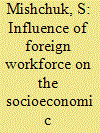

|
|
|
|
|
| Publication |
2013.
|
| Summary/Abstract |
The article analyzes the dynamics of the drawing of foreign workforce to the Far East of Russia from the mid-19th to the beginning of the 21st centuries. It cites results of comparative analysis of quantitative and qualitative indices of the labor migrants' influence on the socioeconomic development of the territory under examination during the pre-Soviet, Soviet and post-Soviet periods. The author characterizes the reasons for drawing foreign workers from the adjacent Asian countries to the Russian Far East and their role in its development.
|
|
|
|
|
|
|
|
|
|
|
|
|
|
|
|
| 7 |
ID:
101926
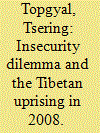

|
|
|
|
|
| Publication |
2011.
|
| Summary/Abstract |
In March 2008, Tibet erupted in the biggest challenge to Chinese rule since 1959. While Beijing and Dharamsala engaged in their familiar battle of representations, pundits speculated on the causes of the uprising, ranging from conspiracy theories to informed policy analysis. Applying the framework of the insecurity dilemma, this article argues that Tibetan identity insecurity on account of the post-1989 hard-line Chinese policies was the chief cause of the uprising. Largely peaceful protests and occasionally violent riots in Tibet have been integral to Tibetan efforts to mitigate their societal insecurities provoked by Chinese migration, 'assimilationist' policies and 'cultural imperialism'. However, Tibetan protests and riots heighten Chinese insecurities and harden Beijing's policies both inside Tibet and towards the Dalai Lama. This paper reveals the dynamic cycle of hard-line Chinese policies provoking Tibetan uprisings; the resulting hardening in Chinese policies feeds back into Tibetan insecurities and protests. The 2008 uprising was the most recent cycle in the long-running saga of the Sino-Tibetan insecurity dilemma. The article warns that unless the Tibetans and the Chinese find a way to break out of the insecurity dilemma, Tibet could explode into another frenzy of violence and counter-violence in the near future.
|
|
|
|
|
|
|
|
|
|
|
|
|
|
|
|
| 8 |
ID:
129806


|
|
|
|
|
| Publication |
2014.
|
| Summary/Abstract |
Before the 21st century, Chinese presence in Libya was minimal. In the last years of the Gaddafi regime, however, a large-scale temporary migrant community quickly formed. Then, as unrest in Libya increased, the community was withdrawn abruptly in early 2011 in China's first officially organized mass evacuation. This short-lived community does not display the characteristics associated with Chinese migration to Africa as a whole, suggesting the necessity of local ethnographic case studies across the continent to form a more accurate and complete picture. Migration was spurred by labour contracted by state-owned enterprises (SOEs) from all over China, and did not feature private traders except for those who provided services for the labourers. It is probable that any recurrence of Chinese migration into Libya will again be SOE-driven, although favourable attitudes and policies on the part of the post-Gaddafi administration could possibly engender a more autonomous minority.
|
|
|
|
|
|
|
|
|
|
|
|
|
|
|
|
| 9 |
ID:
170748


|
|
|
|
|
| Summary/Abstract |
This paper seeks to explore the spaces created by practitioners of the Taiwanese-Chinese religious movement Yiguandao 一 貫 道 (“Way of Pervading Unity”) in urban South Africa. Drawing on ethnographic data from fieldwork conducted in Johannesburg, Pretoria, and Cape Town in late 2017 as well as on published Yiguandao materials, this contribution analyses how these spaces are created, maintained, and charged with meaning. It investigates the uses of these spaces as well as how and why various actors engage in them. By proposing a preliminary typology that is based on the location, function, and mobility of these spaces, this contribution argues that Yiguandao religious spaces represent more intense arenas of transcultural interaction than most other – and predominantly economic – Chinese spaces in Africa.
|
|
|
|
|
|
|
|
|
|
|
|
|
|
|
|
| 10 |
ID:
172443
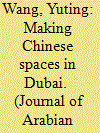

|
|
|
|
|
| Summary/Abstract |
This paper examines the spatial expansion of Chinese communities in the city of Dubai as the result of the strengthening economic ties between China and the Arab Gulf states over the last two decades and the diversification of economy in the Gulf region. Beginning with a brief account of the history of Chinese migration into the UAE, this paper sketches out the contour of Chinese spaces in a rapidly growing global city. This paper contributes to the development of a holistic assessment of the impact of China’s rise in the region and contextualizes the intricate relationships between China and the Arab World. It calls for more ethnographic studies of Chinese communities in the Arab Gulf states and emphasizes the need to broaden the traditional foci and methodology in the study of relations between China and these states.
|
|
|
|
|
|
|
|
|
|
|
|
|
|
|
|
| 11 |
ID:
114778


|
|
|
|
|
| Publication |
2012.
|
| Summary/Abstract |
This case study of Chinese migration to and economic engagement in Laos examines transnational networks and the agendas of particular and diverse actors within the context of post-Cold War globalization and statehood. In her study on the activities of economically motivated new Chinese migration to Laos, a country largely neglected by mainstream overseas Chinese studies, the author sets out to challenge the notion of the retreat and weakening of the state. Applying a migration studies perspective, she argues that transnational networks are not undermining state power but rather strongly impacting on the ways states are operating.
|
|
|
|
|
|
|
|
|
|
|
|
|
|
|
|
|
|
|
|
|